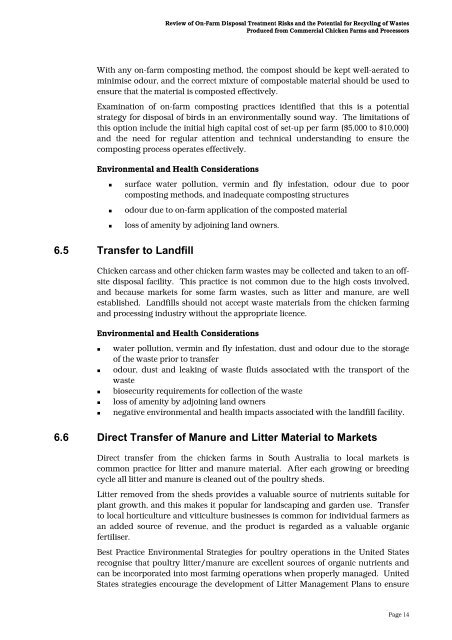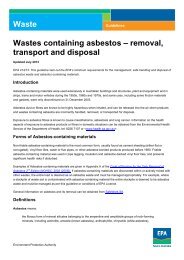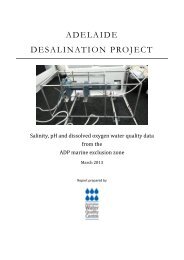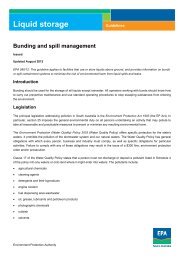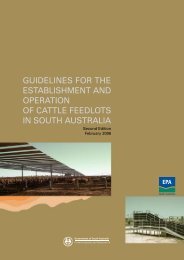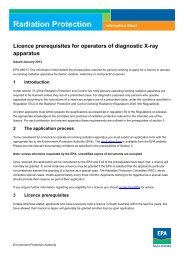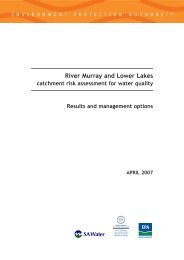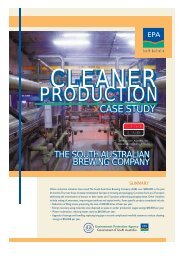Commercial Chicken Farms and Processors - EPA
Commercial Chicken Farms and Processors - EPA
Commercial Chicken Farms and Processors - EPA
You also want an ePaper? Increase the reach of your titles
YUMPU automatically turns print PDFs into web optimized ePapers that Google loves.
Review of On-Farm Disposal Treatment Risks <strong>and</strong> the Potential for Recycling of Wastes<br />
Produced from <strong>Commercial</strong> <strong>Chicken</strong> <strong>Farms</strong> <strong>and</strong> <strong>Processors</strong><br />
With any on-farm composting method, the compost should be kept well-aerated to<br />
minimise odour, <strong>and</strong> the correct mixture of compostable material should be used to<br />
ensure that the material is composted effectively.<br />
Examination of on-farm composting practices identified that this is a potential<br />
strategy for disposal of birds in an environmentally sound way. The limitations of<br />
this option include the initial high capital cost of set-up per farm ($5,000 to $10,000)<br />
<strong>and</strong> the need for regular attention <strong>and</strong> technical underst<strong>and</strong>ing to ensure the<br />
composting process operates effectively.<br />
Environmental <strong>and</strong> Health Considerations<br />
¢ surface water pollution, vermin <strong>and</strong> fly infestation, odour due to poor<br />
composting methods, <strong>and</strong> inadequate composting structures<br />
¢ odour due to on-farm application of the composted material<br />
¢ loss of amenity by adjoining l<strong>and</strong> owners.<br />
6.5 Transfer to L<strong>and</strong>fill<br />
<strong>Chicken</strong> carcass <strong>and</strong> other chicken farm wastes may be collected <strong>and</strong> taken to an offsite<br />
disposal facility. This practice is not common due to the high costs involved,<br />
<strong>and</strong> because markets for some farm wastes, such as litter <strong>and</strong> manure, are well<br />
established. L<strong>and</strong>fills should not accept waste materials from the chicken farming<br />
<strong>and</strong> processing industry without the appropriate licence.<br />
Environmental <strong>and</strong> Health Considerations<br />
¢ water pollution, vermin <strong>and</strong> fly infestation, dust <strong>and</strong> odour due to the storage<br />
of the waste prior to transfer<br />
¢ odour, dust <strong>and</strong> leaking of waste fluids associated with the transport of the<br />
waste<br />
¢ biosecurity requirements for collection of the waste<br />
¢ loss of amenity by adjoining l<strong>and</strong> owners<br />
¢ negative environmental <strong>and</strong> health impacts associated with the l<strong>and</strong>fill facility.<br />
6.6 Direct Transfer of Manure <strong>and</strong> Litter Material to Markets<br />
Direct transfer from the chicken farms in South Australia to local markets is<br />
common practice for litter <strong>and</strong> manure material. After each growing or breeding<br />
cycle all litter <strong>and</strong> manure is cleaned out of the poultry sheds.<br />
Litter removed from the sheds provides a valuable source of nutrients suitable for<br />
plant growth, <strong>and</strong> this makes it popular for l<strong>and</strong>scaping <strong>and</strong> garden use. Transfer<br />
to local horticulture <strong>and</strong> viticulture businesses is common for individual farmers as<br />
an added source of revenue, <strong>and</strong> the product is regarded as a valuable organic<br />
fertiliser.<br />
Best Practice Environmental Strategies for poultry operations in the United States<br />
recognise that poultry litter/manure are excellent sources of organic nutrients <strong>and</strong><br />
can be incorporated into most farming operations when properly managed. United<br />
States strategies encourage the development of Litter Management Plans to ensure<br />
Page 14


